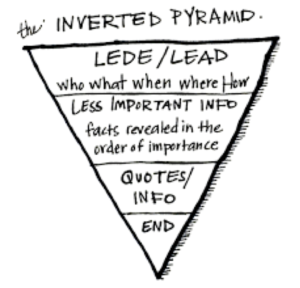
Quiz n Chips (Fri 8th Nov) – Fundraising for Rennie Grove Hospice


Date: 18th October 2019
Speaker: Matt Wright
Business: Nobleword
Topic: Copywriting – Tips n Tricks for Blog Writing

• Always start with a good hook – this means spending some time thinking about your title.
• Connect with the reader’s emotions – don’t be overly descriptive, be dramatic!
For example:
ARRESTING TITLE: “Boris Johnson’s BREXIT strategy is straight out of Nixon’s Cold War playbook”
1-SENTENCE SUMMARY: Game theory can teach us a lot about Johnson’s Brexit negotiating strategy.
So, the arresting title grabs the reader’s attention (dramatic!) then the first thing they read is the 1-sentence summary regarding what the blog is about (descriptive).
Give your blog a context for the reader to identify with and relate back to your product/service.
For example:

• Be punchy and concise
• Put your main argument upfront
• Don’t be afraid of being provocative, assertive, or short on detail….you can expand upon this later on.
Click here to view Matt’s Cross Reference page.
Date: 18th October 2019
Speaker: Tim Brooker
Business: Beyond Numbers
Topic: Accountancy
Victors in business exhibit the following behaviours – they play ‘above the line’:
Ownership – not just in a legalistic sense but also in a holistic sense covering all aspects of an organisation, not just financial aspects; e.g. employee welfare, commitment to achieving missions & goals…etc.
Accountability – a willingness to be held answerable for one’s actions (note this is explicit versus ownership which is intrinsic).
Responsibility – being in charge of a task or event (note that responsibility can be shared, unlike accountability)
However, victims in business tend to react as follows – they play ‘below the line’:
Blame – they blame somebody else.
Excuse – they make excuses for their actions.
Denial – they deny there is a problem in the first place.
Ownership, Accountability and Responsibility are ‘above the line’ attributes – they relate to people who are willing take control of their lives and their actions.
On the other hand, Blame, Excuse and Denial are ‘below the line’ attributes – they are exhibited by people who devolve responsibility and allow external factors to determine their success.
Hence, for those business people who live their life ‘above the line’, success becomes a self-fulfilling prophecy – the more they succeed, the more they become used to success and the more their actions create success.
Click here to view Tim’s Cross Reference page
Date: 4th October 2019
Speaker: Emma Hollings
Business: Emma Hollings Photography
Topic: Social Media
“Social media is a funny thing – the busier you are, the more people appear to be interested in you!”
1. Document what you do
• It’s surprising how many people are interested in what you’re up to and who you’re meeting – the number of times that sparks a conversation is amazing!
• So, don’t ‘overthink’ it – just get into the habit of posting and you’ll soon get a better feel for it.
2. It’s not just about posting – it’s about engaging
• People love stories…they don’t like selling.
• As you post more, you’ll become much more aware of what generates comments and interaction.
3. Create intrigue
• For example, Emma noted that photos with her in (as a photographer) seemed to attract far more engagement.
• The rationale: clients generally don’t like having picture taken, but view it as a ‘necessary evil’. Therefore, a photographer stepping out of her comfort zone and appearing in front of the camera provides a fresh new angle.
What works in social media? Well, it depends upon your business, but a personal summary from Emma highlights the following:
• Facebook – great for engagement / have a separate business v personal account.
• LinkedIn – great for connections – shows how many views a post has received.
• Instagram – ‘credibility’ (for a photographer) but note that you do have to do it from your phone (you can’t upload photos from your PC apparently).
“I really don’t like social media that much, but I’ve taught myself to be disciplined…and it does work!”
Click here to view Emma’s Cross Reference page.
Date: 4th October 2019
Speaker: Olly Denhard
Business: IT Trouble Free – IT solutions for small & medium-sized businesses
https://www.ittroublefree.co.uk
Topic: Cyber security
October is the month for ghouls and ghosts (Hallowe’en), so perhaps it’s apt that it’s also Cyber Security month?
Olly outlined some basic housekeeping for our most-oft used electronic devices:
1. Desktop
* Back-up of data – don’t back up to the same device you are transferring from!
* A physical back-up to an external hard disk combined with an automated cloud-based back-up will ensure business continuity
2. Laptop
* Antivirus software – whilst primarily designed to protect computers against viruses, many antivirus programs now protect against other types of malware, such as spyware, adware, and rootkits as well.
* Sophos is a very reputable (free) product which protects both Windows and Mac laptops (yes, Macs are vulnerable to viruses too!)
3. Phone
* Passwords – use 2-factor authentication wherever possible and don’t use the same passwords over and over again.
• LastPass saves your passwords and gives you secure access from every computer and mobile device.
October is National Cyber Security Awareness Month (NCSAM), “a collaborative effort between government and industry to raise awareness about the importance of cybersecurity.”
In a rare moment of global co-operation, NCSAM is taking place simultaneously across Europe and the USA.
Europe: https://cybersecuritymonth.eu
USA: https://niccs.us-cert.gov/national-cybersecurity-awareness-month-2019
Remember that if you hold any client data on your electronic devices, under GDPR you are legally required to make sure this data is safe and protected.
Click here to view Olly’s Cross Reference page.
Date: 16th August 2019
Speaker: Ian Thomas
Business: Debt Talk
Topic: Hypnotherapy in business
Hypnotism helps you to access your subconscious state of mind.
By doing so, hypnotism enables you to put aside the fears and doubts that routinely plague your conscious mind.
Click here to view Ian’s Cross Reference member’s page.
Related articles
Open questions – why do they work and when do they work best?
Date: 16th August 2019
Speaker: Patricia Buckland
Business: Debt Talk
Topic: Financial Literacy & Planning
The 7-step method [above] was authored by a US psychologist (Dr Brad Klontz) and represents a tried and tested psychological technique – to achieve a goal (or a dream) you need to write it down and visualise it in order to commit to it.
“If you write it down, you make it real..it forces you to focus…and opportunities will come into your life.”
Click here to view Particia’s Cross Reference member’s page.
Date: 2nd August 2019
Speaker: Ash Taylor
Business: In2out Business Growth Coach
Topic: Business growth and efficiency
If you are afraid of failing at the things you find challenging, use the Skill/Will graph to identify what you are not good at.
From here, you can take steps to outsource these tasks from your business (or become more efficient at doing them), leaving you free to concentrate on the tasks where you can add value to your business.
Click here to view Ash’s Cross Reference member’s page.
Date: 2nd August 2019
Speaker: Roger Rawlinson
Business: Elite Coaching
Topic: Executive Coaching – Resilience
In a word, yes.
Roger related the experiences of some of the middle-aged executive clients he had been coaching to illustrate that it’s not just the younger generation who have problems dealing with setbacks.
Executive high-flyers who have never previously experienced failure in their academic or professional careers are just as likely to suffer from a ‘lack of resilience’ when it comes to coping with adversity as the younger Millennial generation.
Click here to view Roger’s Cross Reference member’s page.